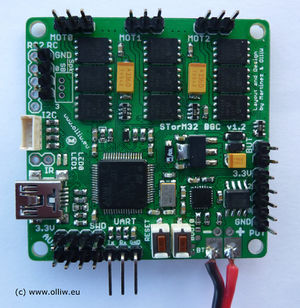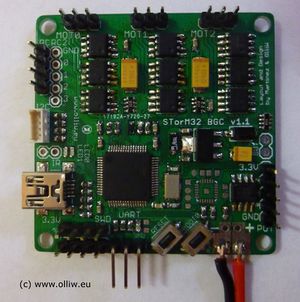Boards: Difference between revisions
Jump to navigation
Jump to search
No edit summary |
No edit summary |
||
| Line 1: | Line 1: | ||
At present, three different versions of STorM32-BGC boards are | At present, three different versions of STorM32-BGC boards are in use (the v0.17/v1.0 seems not to be in used anymoe). | ||
| Line 6: | Line 6: | ||
* To avoid confusion/missunderstandings please note: The boards provide many features hardware-wise, but not all are currently supported by the firmware. | * To avoid confusion/missunderstandings please note: The boards provide many features hardware-wise, but not all are currently supported by the firmware. | ||
== STorM32-BGC v1. | == STorM32-BGC v1.3 == | ||
{| | {| | ||
|- valign="top" | |- valign="top" | ||
| Line 21: | Line 20: | ||
* joystick for each axis | * joystick for each axis | ||
* additional I2C port (I2C#2) | * additional I2C port (I2C#2) | ||
* | * 3 auxiliary ports | ||
* BUT port | * BUT port | ||
| | | | ||
| Line 27: | Line 26: | ||
* motor current: max. 1.5 A per motor<br/> comment: this is not yet fully exploited and depends also on the motor driver package (SOIC or DFN); for DFN packages, motors with resistances of 15 Ohm or larger have been tested to be easily handled at 4S, it is expected that also motors with 10 Ohm or larger are handled well (for more details see [//www.rcgroups.com/forums/showthread.php?t=2055844&page=2&pp=50#post27515444 here]). | * motor current: max. 1.5 A per motor<br/> comment: this is not yet fully exploited and depends also on the motor driver package (SOIC or DFN); for DFN packages, motors with resistances of 15 Ohm or larger have been tested to be easily handled at 4S, it is expected that also motors with 10 Ohm or larger are handled well (for more details see [//www.rcgroups.com/forums/showthread.php?t=2055844&page=2&pp=50#post27515444 here]). | ||
|} | |} | ||
== STorM32-BGC v1.2 == | |||
[[File:Storm32 bgc v120 board dfn mpu-01-wp01.jpg|thumb|caption|STorM32 BGC board v1.2 with motor drivers in DFN package]] | |||
Differences to the v1.3 board: | |||
* voltage regulator: smaller SOT223 package | |||
* only 2 auxiliary ports | |||
== STorM32-BGC v1.1 == | == STorM32-BGC v1.1 == | ||
| Line 34: | Line 40: | ||
* Spektrum satellite is supported, but no extra Spektrum connector on board | * Spektrum satellite is supported, but no extra Spektrum connector on board | ||
* no extra USB voltage protection diode | * no extra USB voltage protection diode | ||
* voltage regulator: smaller SOT223 package | |||
* only 2 auxiliary ports | |||
'''Comment:''' The order of pins on the I2C#2 port is reversed to that on the I2C#1 port; please consider this then connecting an MPU module to this port. | '''Comment:''' The order of pins on the I2C#2 port is reversed to that on the I2C#1 port; please consider this then connecting an MPU module to this port. | ||
| Line 48: | Line 55: | ||
* no additional I2C port | * no additional I2C port | ||
* no reverse voltage protection on the v0.17 board | * no reverse voltage protection on the v0.17 board | ||
* voltage regulator: smaller SOT223 package | |||
* only 2 auxiliary ports | |||
* pin assignment on RC port different | * pin assignment on RC port different | ||
'''Comment:''' The location of the pins needed to flash the firmware via an USB-TTL adapter is different here. Namely: | '''Comment:''' The location of the pins needed to flash the firmware via an USB-TTL adapter is different here. Namely: | ||
Revision as of 13:40, 22 March 2014
At present, three different versions of STorM32-BGC boards are in use (the v0.17/v1.0 seems not to be in used anymoe).
Comments:
- The boards can in principle be populated with different microcontrollers; below the "typical" configuration is mentioned.
- To avoid confusion/missunderstandings please note: The boards provide many features hardware-wise, but not all are currently supported by the firmware.
STorM32-BGC v1.3
|
|
STorM32-BGC v1.2
Differences to the v1.3 board:
- voltage regulator: smaller SOT223 package
- only 2 auxiliary ports
STorM32-BGC v1.1
Differences to the v1.2 board:
- no Futaba S-bus support
- Spektrum satellite is supported, but no extra Spektrum connector on board
- no extra USB voltage protection diode
- voltage regulator: smaller SOT223 package
- only 2 auxiliary ports
Comment: The order of pins on the I2C#2 port is reversed to that on the I2C#1 port; please consider this then connecting an MPU module to this port.
STorM32-BGC v0.17/v1.0
Differences to the v1.2 board:
- MCU: STM32F103RB
- motor drivers: only TC4452VAO in SO08 package
- no IR led support
- only three PWM/Sum-PPM inputs/outputs
- no Futaba S-bus support
- Spektrum satellite can be supported, but no extra Spektrum connector on board
- no additional I2C port
- no reverse voltage protection on the v0.17 board
- voltage regulator: smaller SOT223 package
- only 2 auxiliary ports
- pin assignment on RC port different
Comment: The location of the pins needed to flash the firmware via an USB-TTL adapter is different here. Namely:
- RC-GND = GND -> connect it to GND on the usb-ttl adapter
- RC-1 = Uart1-Tx -> connect it to Rx on the usb-ttl adapter
- RC-2 = Uart1-Rx -> connect it to Tx on the usb-ttl adapter

